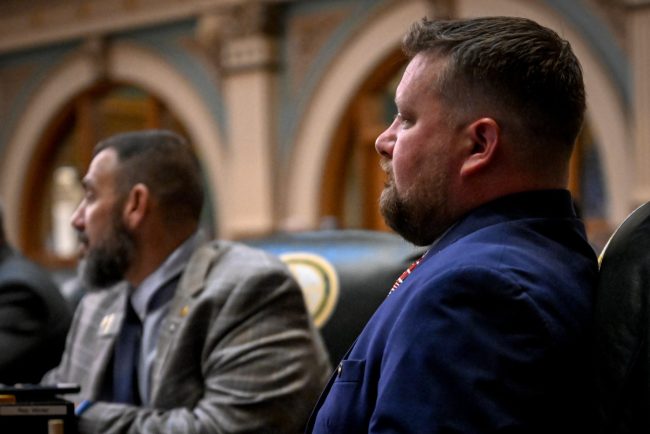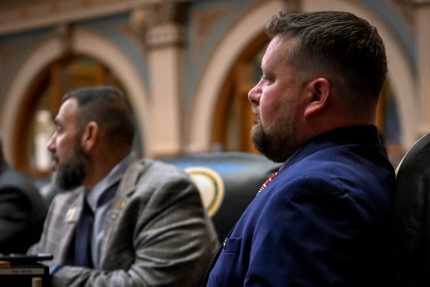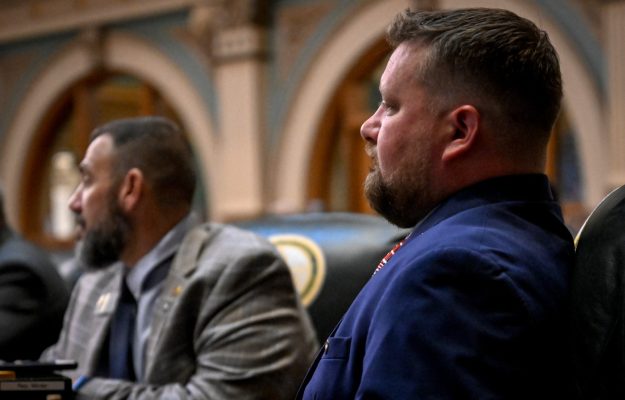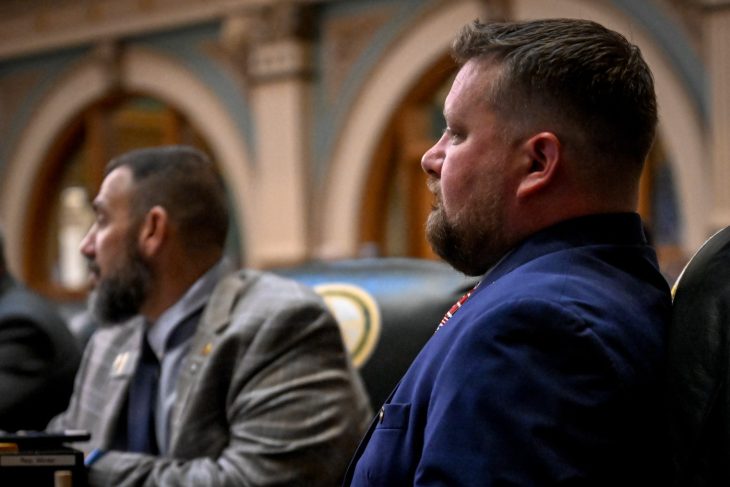
by Admin
Colorado’s economy may be slowing, but it’s not a time to panic (Opinion)
The headlines are loud again, full of warnings about economic slowdown, falling business confidence, housing anxiety, tariff threats and more. It’s no surprise that many in Colorado are feeling jittery — tempted to make significant changes to their investments and business plans. But the wiser […]
Columnists
by Admin
Rep. Weinberg drops bid for leadership amid allegations of impropriety. It’s progress. (Opinion)
Do not despair about Rep. Ron Weinberg’s gross behavior, but rejoice that brave women came forward to share their experiences and quickly shut down his political advancement. Do I know for certain that Heather Booth, an elected school board member from Elizabeth, and Jacqueline Anderson, […]
Columnists
by Admin
Yes, “junk science” is published, but once again Trump’s administration misses the mark (Opinion)
Communications experts suggest that the best way to get a conversation going with someone you disagree with is to ask them to talk about themselves. Unfortunately, I have found that asking “What the heck is wrong with you??!?” is really not a good way to […]
Columnists
Colorado’s economy may be slowing, but it’s not a time to panic (Opinion)
by Admin
The headlines are loud again, full of warnings about economic slowdown, falling business confidence, housing anxiety, tariff threats and more. It’s no surprise that many in Colorado are feeling jittery — tempted to make significant changes to their investments and business plans. But the wiser […]
ColumnistsThe headlines are loud again, full of warnings about economic slowdown, falling business confidence, housing anxiety, tariff threats and more. It’s no surprise that many in Colorado are feeling jittery — tempted to make significant changes to their investments and business plans.
But the wiser move right now may be to pause. Not freeze. Not panic. Just … pause.
After weeks of examining economic reports, reviewing business filings, and speaking with executives, economists and residents across the state, a clear picture has emerged: The dominant narrative of decline, pessimism and retreat doesn’t align with what’s actually happening on the ground.
This is a moment where noise is drowning out signals, and people’s instinct to avoid risk often kicks in before we’ve had a chance to consider the facts.
Yes, confidence among Colorado business leaders has dropped. According to an index from the University of Colorado Boulder, it’s now at its third-lowest point in over two decades. But confidence is not a measure of economic reality — it’s a feeling, and feelings are not facts. Ask someone how they feel about the economy, and you’re just as likely to hear their views on the political climate.
Surveys may register anxiety, but actual behavior, of both consumers and businesses, suggests a more measured outlook.
Spending remains resilient. In the first quarter of 2025, credit card usage in Colorado rose 9.4% from a year earlier, ranking the state 16th nationwide, according to the Federal Reserve. Household finances are solid, too. Mortgage payments as a share of income are near record lows, thanks largely to widespread refinancing during the pandemic. And in the Denver metro area, home sellers received at least 99% of their listing prices in the first four months of the year, according to the Colorado Association of Realtors.
Consumers, in short, have a cushion. They also have options.
The same is true for businesses. Across sectors, companies have slimmed down, increased efficiency and developed operational models with built-in flexibility. These are not firms bracing for collapse; they are lean, adaptable and capable of making strategic shifts without panic.
This brings us to a practical but often overlooked principle: don’t confuse activity with progress. In an uncertain economy, the urge to do something can be misleading. Movement for its own sake doesn’t always lead in the right direction.
The better approach is balanced and deliberate. Don’t overreact, and don’t underreact. Don’t chase headlines or pivot every time the narrative shifts. Instead, focus on the fundamentals of your business, your household and your local economy.
Context matters. This is not 2008. It’s not even 2020. Over the past 20 years, the U.S. has endured only two major recessions with deep, lasting effects. Most other downturns have been noisy but ultimately fleeting.
Today’s conditions, while uneasy, remain fundamentally sound. Colorado banks are well-capitalized. Credit quality is high. Liquidity is strong. Businesses that qualified for loans a year ago still can, and banks — facing a lull in big-ticket deals like mergers, expansions and large-scale hiring — are often competing more aggressively for new lending opportunities.
That’s not instability. That’s discipline.
Even amid caution, optimism persists. In the first quarter of this year, new business filings in Colorado surged. People exit businesses for all sorts of reasons, but they start them for only one: They believe there’s a future worth building.
So why all the gloom? Part of it is psychological. Colorado has spent much of the past two decades as a top-performing state, leading in job growth, population gains and innovation. That high-flyer status shaped expectations.
Now the pace has slowed. Denver continues to grow, but not as rapidly. The wave of young professionals has eased, replaced in part by older adults relocating to be near children and grandchildren. It’s a different type of growth — quieter and less headline-friendly.
To some, that shift may feel like a letdown. In reality, it’s a necessary recalibration.
There’s a silver lining, especially in housing. Years of intense demand led to a boom in multifamily construction. That supply has now overtaken demand, bringing down rents across the Denver metro area. According to CBRE, average rents fell 4.1% year-over-year in the first quarter of 2025. That may be unwelcome news for some developers, but it’s an essential correction for a city where affordability had become a major barrier.
If you’re a business owner, this is the time to stay grounded. Let strategy be your compass. Adjust your tactics when needed, but don’t abandon the fundamentals. If you decide to pull back, do it based on the data that directly impacts your operation, and not just what’s being said in the broader conversation.
If you’re a resident, particularly one concerned about jobs or housing, take a wider view. Colorado’s economic strengths — its skilled workforce, its well-managed banks and its enduring culture of entrepreneurship — remain intact.
The real danger isn’t recession — it’s overreaction. It’s mistaking a slowdown for a freefall, and fear for fact. Colorado’s economy may not be sprinting anymore. But it’s still moving, still breathing, still building what’s next.
Joe Nimmons is the Colorado region president of Huntington Bank. Ian Wyatt is the director of economics at Huntington Bank.
Sign up for Sound Off to get a weekly roundup of our columns, editorials and more.
To send a letter to the editor about this article, submit online or check out our guidelines for how to submit by email or mail.

by Admin
Rep. Weinberg drops bid for leadership amid allegations of impropriety. It’s progress. (Opinion)
Do not despair about Rep. Ron Weinberg’s gross behavior, but rejoice that brave women came forward to share their experiences and quickly shut down his political advancement. Do I know for certain that Heather Booth, an elected school board member from Elizabeth, and Jacqueline Anderson, […]
ColumnistsDo not despair about Rep. Ron Weinberg’s gross behavior, but rejoice that brave women came forward to share their experiences and quickly shut down his political advancement.
Do I know for certain that Heather Booth, an elected school board member from Elizabeth, and Jacqueline Anderson, the former vice chair of the Mesa County Republican Party are telling the truth in their letter recounting Weinberg’s inappropriate remarks? No, but if #MeToo taught us anything, it’s that the cost of speaking up in politics is high, and remaining silent is rewarded. These brave women appear to have no motive other than to do the right thing by coming forward. Also, others witnessed the remarks.
Weinberg has denied that he made sexual remarks to the women and has hired an attorney.
However, he also quickly stepped down from his bid for a leadership position for Colorado House Republicans. This is progress, even though House Minority Leader Rose Pugliese did not use her position of influence to pressure him to drop his bid.
The #MeToo movement hit Colorado’s state Capitol hard in 2017, culminating in the unprecedented ouster of one lawmaker – Rep. Steve Lebsock – who was accused of making unwanted sexual advances to interns and another lawmaker. However, few people remember that two other lawmakers faced a reckoning for their bad behavior and that one of them remained in office and served out his term as if nothing had happened. Rumors about the other lawmaker’s bad behavior swirled, but nothing else came to the surface.
At the time, I wrote a column describing working at the Capitol as a “gauntlet of sexual harassment:” unwanted advances, alcohol-fueled inappropriate remarks, and just plain old sexism. The worst part was the complete lack of accountability for elected officials. There was no human resources department to consider a complaint, and while accountable to the public, politicians seemed secure in their knowledge that no one would dare to speak out.
But that has changed.
The Colorado General Assembly now has a robust process for considering complaints. In the wake of the Lebsock saga, lawmakers created “workplace expectations” to give employers and employees at the Capitol standards. The House and Senate ethics committees have investigated everything from lawmakers driving drunk or appearing at events intoxicated to a senator’s mistreatment of her staff and subsequent creation of a fake letter of support.
There are holes in the safety net. The ethics committee doesn’t have purview over the complaints about Weinberg – the events happened before the man was elected to the Colorado House to represent District 51 in Larimer County.
Despite those holes, accountability continues to come for Colorado lawmakers who behave badly. Yes, voters always have elections to hold elected officials responsible for their choices, but voters can’t exercise that power if they aren’t informed. Formal investigations help empower people.
No one is circling the wagons to defend Weinberg, or sitting idly by hoping the allegations are forgotten.
The process is not perfect. Bad behavior will continue.
But women and men now know they don’t have to tolerate obscenity. The women who spoke up have their own power in this state, and I applaud them for using their positions to ensure other women don’t suffer the nonsense Weinberg spewed their way.
Megan Schrader is the opinion editor of The Denver Post.
Sign up for Sound Off to get a weekly roundup of our columns, editorials and more.
To send a letter to the editor about this article, submit online or check out our guidelines for how to submit by email or mail.
Updated July 9, 2025 at 11:14 a.m. Due to an editor’s error, this column was updated to reflect the fact that the House ethics policy does apply to journalists and lobbyists. The column was also updated to show that Pugliese did not pressure Weinberg to drop his bid for a leadership role.

by Admin
Yes, “junk science” is published, but once again Trump’s administration misses the mark (Opinion)
Communications experts suggest that the best way to get a conversation going with someone you disagree with is to ask them to talk about themselves. Unfortunately, I have found that asking “What the heck is wrong with you??!?” is really not a good way to […]
ColumnistsCommunications experts suggest that the best way to get a conversation going with someone you disagree with is to ask them to talk about themselves. Unfortunately, I have found that asking “What the heck is wrong with you??!?” is really not a good way to start a productive conversation. But I am not ready to abandon it entirely.
My most recent voicing of that question was in response to last week’s announcement that the U.S. Department of Health and Human Services, under Secretary Robert F. Kennedy, Jr., had canceled its subscriptions to the 3,000 or so scientific journals published by Springer Nature. According to Andrew Nixon, the HHS spokesperson, “All contracts with Springer Nature are terminated or no longer active. Precious taxpayer dollars should be (sic) not be used on unused subscriptions to junk science.”
As a former editor at Nature Publishing, I would quibble with Nixon’s misinformed assessment of the quality of science published in the peer-reviewed Nature journals, and the central importance of most of those publications for overall scientific knowledge and progress. I suspect his real objection to the Nature titles (or the objection of his boss, whom he is obviously parroting) is not that the published science is junk, but rather that it contradicts the pseudoscientific brain-worm droppings of the HHS secretary and those around him. In that context, “What the heck is wrong with you?” seems like an eminently reasonable thing to ask.
To be fair, there is a lamentable increase in the number of scientific papers being published that can only be described as, well, “junk science.” This contamination of the literature includes an alarming proliferation of outright fraudulent publications in an expanding avalanche of new digital-only “science journals.” The primary reason for this rapid growth is the unrelenting pressure on scientists to publish often and in as good a journal as possible to earn tenure, hire post-docs and techs, keep grant money coming in, and maybe even found a biotech pipe-dream company. Publication count and quality have pushed aside virtually all other metrics of scientific worth in many places.
Sadly and predictably, despite ongoing efforts to stop it, publication quality has suffered as the quantity has increased. About two million papers across all science publishing history were indexed in the main publication databases in 2016. Five years later, three million papers have appeared, despite a drop in the number of new PhD students and researchers. Fewer scientists are writing and/or reviewing far more papers than ever before: an unsustainable situation. As a result, the quality of peer review — the primary guardian of scientific quality — suffers, which in turn leads to crappy papers and the not-entirely inaccurate statements like those of HHS’s Nixon.
It is also true that the leading global scientific publishers are for-profit companies that generally achieve large annual profit margins, most of that coming from the strained budgets of academic and corporate libraries. By “bundling” a bunch of less worthy journals with their flagship titles, they can command eye-popping prices for subscription access. There is a fundamental tension between the goals of publishing meaningful science and publishing to promote shareholders, a tension that can be used by opponents like RFK to raise questions about the whole enterprise.
But to focus solely on the negatives of what is an overwhelmingly positive aspect of the scientific enterprise is exactly what the Trump administration wants. They are proficient at ferreting out the less-desirable facets of many of our institutions and programs and turning them into the defining features for public consumption. Although I can’t entirely dismiss HHS’s formal claims about junk science, I can insist that over-emphasizing the extent of those claims is only distracting from the much larger overall good provided by scientific publishing.
Being constantly on defense over trumped-up negatives, whether on this topic or on immigration, gender identity, health care, etc., is exhausting. It is also demoralizing to see most of our elected representatives mired down themselves in defensive, almost apologetic crouches rather than pushing back — hard. Maybe we can start changing the current “on-our-heels” dynamic by going on the offense, including asking publicly and loudly where appropriate, “What the heck is wrong with you?”
Fintan Steele is an ex-Benedictine monk and priest with a Ph.D. in biology/genetics. He spent most of his life in science communications, including scientific publishing and, most recently, for biopharma and academic centers. He and his husband live in Hygiene. Email: fsteele1@me.com.
Sign up for Sound Off to get a weekly roundup of our columns, editorials and more.
To send a letter to the editor about this article, submit online or check out our guidelines for how to submit by email or mail.

by Admin
Social Security is now a shill for Trump. Trust nothing. (Letters)
SSA is now a shill for Trump. Trust nothing. I woke Friday morning to an email from the Social Security Administration bragging about Donald Trump’s “big, beautiful bill” and how it was advantageous to me as a Social Security recipient. I verified this was actually […]
LettersSSA is now a shill for Trump. Trust nothing.
I woke Friday morning to an email from the Social Security Administration bragging about Donald Trump’s “big, beautiful bill” and how it was advantageous to me as a Social Security recipient. I verified this was actually from the SSA.
I have endured five and a half months of bad news on immigration, cuts to agencies, cuts to benefits and programs, but this sent me over the edge. I can no longer believe anything the government tells me about the state of our country; the economy, employment, poverty, or health, and I fear even more about the coming elections and how they could be tainted.
Using the sanctity of the SSA to promote political ideology is beyond my comprehension in a free society. But we are no longer free, and this nailed it for me.
Mark Brown, Denver
Are e-bikes the problem?
Re: “Must e-bikes go all the same places as old-fashioned bikes?” July 3 commentary
The issue of e-bikes is not restricted to national parks. One of the nicest features of living in the Denver metro area is the network of pedestrian/bike trails. The faster e-bikes are now making these dangerous. An e-bike is a motorcycle, but it is a silent motorcycle. Walkers and conventional bikers can’t hear them coming. When a twenty-something flies past me without warning on a trail the width of a wide sidewalk, it is scary. Cities need to enforce the signs about no motorized vehicles.
Ray Harlan, Denver
Slim Woodruff’s commentary about e-bikes going everywhere “old-fashioned bikes” go, while humorous, also makes some broad assertions about us e-bike riders. I’ve had a class 1 e-bike for ten years and I’ve never ridden it where it isn’t allowed. There will always be irresponsible e-bike riders, just as there are irresponsible regular bike riders. I’ve nearly been run off the trail by regular riders who think they’re in the Tour de France. My 90-year-old mother was almost knocked over with her walker on a hospital sidewalk by a regular cyclist who was going so fast he could barely stop. Then he yelled at her for being in his way. Jerks will be jerks regardless of their chosen means of transportation.
Kari Epstein, Denver
Keep fireworks out of neighborhoods
Where is the enforcement when it comes to illegal fireworks in Colorado? Pretty basically, fireworks that explode or leave the ground are illegal.
The selfish actions of a few people are allowed to disrupt the quiet and serenity of our neighborhoods. The overwhelming majority of residents in my Westminster/Arvada neighborhood did not have a fireworks display in the street. About five residents within a four-block radius rained one explosion after another down on us through post-midnight hours.
Does anyone give any selfless thought to the war veteran who may be suffering P.T.S.D., or the pets that cower in fear at every burst of noise? What about the risks being taken? Annually there are news stories about a structure that burned, or a hand injury or a grass fire. Every careless act puts the safety of citizens, first responders and property at risk. What about those that just want to enjoy a quiet evening at home relishing the extra day off for the week? What about the people who had to work on the holiday and want to wind down quietly?
There are public displays all over the metro area. I enjoy a good fireworks show as much as anyone … at the baseball game, the rodeo, the fair or the park, but not in the neighborhoods.
Rich Linnebur, Westminster
Sign up for Sound Off to get a weekly roundup of our columns, editorials and more.
To send a letter to the editor about this article, submit online or check out our guidelines for how to submit by email or mail.

by Admin
Owning Pride: Overcoming oppression and being true selves (Letters)
Owning Pride: Overcoming oppression and being true selves Re: “Keep government out of Pride, whether it’s Trump or Biden,” June 29 commentary Had I grown up with a legion of Krista Kafers as my parents and neighbors and teachers and schoolmates and doctors and shopkeepers, […]
LettersOwning Pride: Overcoming oppression and being true selves
Re: “Keep government out of Pride, whether it’s Trump or Biden,” June 29 commentary
Had I grown up with a legion of Krista Kafers as my parents and neighbors and teachers and schoolmates and doctors and shopkeepers, I would likely think and feel as she does about gay “pride” — live and let live without judging or celebrating someone because of immutable characteristics like skin color or ethnic origin or sexual orientation or gender identity.
I grew up as a closeted gay person. From my earliest awareness of attraction to other boys, I was acutely aware that most of those people would judge and perhaps harm me for who I was.
I read in school books, newspapers and my church bulletins that I was “sick” and “perverted.” In Sunday school I was literally told I would be “damned to hell forever.” When, finally, in my early 20s, I told my parents I was gay, my father said, “You disgust me and are no son of mine”, and my mother shut the tiny door of any affection she ever gave me. I am not “proud” because I am gay. I am proud because somehow I found in the depths of my being, against all these realities of my young life, the courage to simply be and live openly as the gay person I am.
Actually I prefer the term “queer” because it gives me a sense of solidarity with all the others whose rainbow of attributes led to living under similar oppression. I appreciate Krista for not judging me and other queer people. I encourage her to consider that celebrating gay pride is about something we have accomplished and our healing from oppression.
Wayne Thrash, Denver
I take issue with the commentary. Specifically, Krista Kafer tells us her definition of “pride.” In her opinion, gay folks do not use the word correctly.
“It’s understandable that people who feel unaccepted because of their sexuality use the word ‘pride’ in this way. The trouble with identitarian usage, however, is that only some people are allowed to apply it that way. One can be proud to be a woman but not a man, proud to be Black or Hispanic but not white, proud to be gay but not straight,” Kafer writes.
Sounds fishy to me. I can state that I am proud of myself. No person should take issue with the usage of pride in that sentence, contrary to what Kafer says.
Kafer fails to recount the root cause and the beginning of Pride Day. Being gay used to be something people tried to hide in many cases. We need to look no further than the story of Matthew Shepard to see how it could be deadly to be outed as gay, not to mention the risk of job loss or other societal privilege. I think of Pride Day as a day to be proud of who you are with no qualifications. Let my friends in the gay community have their day.
Byron Bergman, Denver
While I believe Krista Kafer had good intentions in writing her column on pride flags and use of the word “pride,” I think she misses a couple of points about folks who aren’t white or straight, those who she says “aren’t allowed” to use the word “pride” in a positive context.
First, complaining that straight white people aren’t allowed to use a particular word is like a child not wanting to share any of their toys with the other kids. You don’t have to win everything; let other people claim a word if they want.
Second, at the end of her column, Kafer states that she doesn’t take “pride” in being white and straight because she didn’t get to choose those identities. I can assure you that the vast, vast majority of gay and trans-related folks don’t feel they had a choice, either.
D. Laughren, Golden
Give Congress members a taste of their own medicine
Re: ” Trump bill: Senators launch weekend of work,” June 29 news story
After reading how cuts are going to affect real people, not imaginary ones, I think Congress members and the White House occupants should immediately lose their government health insurance and any housing allowance they get to live in the DC area. If they are getting cancer treatment, it should stop, and any experimental treatment or hormone meds should stop.
If it’s OK for them to take health care away, food supplements away, housing assistance, veterans’ care, educational assistance from the American public, there’s got to be some reality check.
Try paying your meds without insurance, Congress; try paying your own rent and your own transportation.
In addition, their pay should stop immediately and they should see how the rest of the real world lives for once. If it is OK for Congress to make deep cuts, how about it directly impacting them?
These actions are akin to what Hitler did in Germany: send away anyone of color or a different religion, starve people, and put people in camps. It sounds familiar. Is that the America we want? I think not.
Cheryl Brungardt, Wheat Ridge
If it quacks like a duck …
Re: “Trump’s ICE is deliberately targeting noncriminals,” June 29 editorial
I’m in absolute agreement with The Denver Post Editorial Board on this subject. What President Donald Trump is doing sure looks and feels like what’s been done in fascist states: targeting specific ethnic nationalities, ignoring the rule of law, and adopting the methods of historical dictators. What’s being done in our country, our democracy, is outrageous and is definitely not making our country great.
Jeannie Dunham, Denver
Too soon to applaud the Supreme Court
Re: “Court limits nationwide injunctions,” June 28 news story
A few years from now, a future president will declare a national gun violence emergency and issue an executive order declaring it illegal to own a gun, saying that today’s gun owners are not part of a “well-regulated Militia.” Of course, there will be cries of “that’s unconstitutional!” and lawsuits by people trying to get their guns back.
Thanks to Friday’s Supreme Court decision to kick the teeth out of the lower federal courts, the only people getting their guns back would be the individual plaintiffs. The president wouldn’t care, knowing that most Americans don’t have the time and resources to sue.
Besides, the president doesn’t have to appeal all the one-by-one rulings against the executive order.
I’m confident the Supreme Court will eventually overrule Trump’s blatantly unconstitutional executive order ending birthright citizenship. But what’s to stop him from issuing another order the next day? Don’t look for help from federal judges who are now stripped of the power of universal injunction.
Andrew Bartlett, Longmont
Kennedy’s bad decisions
Re: “These families don’t forget damage done by diseases,” June 29 news story
Thank you for the Sunday article recounting the history of vaccines. Indeed, vaccines have saved millions of lives and prevented millions of debilitating illnesses and physical impairments. Robert Kennedy Jr.’s own family warned us that he was not a rational-thinking guy. One of my best friends from 60 years ago (I was 15) had a permanent limp from polio. History is clear: Vaccines are not a problem. How is it that “Teflon Trump” keeps getting away with absurdly bad management decisions?
Jim Rankin, Highlands Ranch
Sign up for Sound Off to get a weekly roundup of our columns, editorials and more.
To send a letter to the editor about this article, submit online or check out our guidelines for how to submit by email or mail.

by Admin
Kafer: Disabled people need support, not a prescription to die
I fear for my future self. When I was a teen, a suicide attempt put me in the hospital. I recovered from the pill overdose and got the treatment I needed to manage depression, a condition that has never ceased to be my shadow. It, […]
ColumnistsI fear for my future self.
When I was a teen, a suicide attempt put me in the hospital. I recovered from the pill overdose and got the treatment I needed to manage depression, a condition that has never ceased to be my shadow. It, along with chronic pain from an autoimmune arthritic disease, has darkened moments of an otherwise good life. I can’t help wonder, though, if I were 76 instead of 16, and lying in that hospital bed if doctors would have simply offered to finish the job and prescribed suicide instead of offering life-preserving help.
Impossible? Original laws in Canada, Belgium, and the Netherlands legalizing assisted suicide for the terminally ill have been expanded to cover those with chronic and mental ailments. In the latter two countries, even children may request euthanasia. The Netherlands and Belgium have seen a rise in assisted suicide among those for whom mental illness is the only underlying condition. Patients with mental illness will be eligible for assisted suicide in Canada in 2027. Already euthanasia has become the 5th leading cause of death north of our border.
If euthanasia laws are a slippery slope, we’ve taken the first downhill stride here in Colorado. The legislature has expanded the 2016 voter-approved initiative law to allow more people to prescribe assisted suicide pills and has shortened the waiting period. How long before medical personnel can offer people like me who struggle with chronic illness and depression a way out instead of a way forward?
For those with life-threatening, rather than merely debilitating chronic conditions like mine, the 2016 law was a precipice not a slope from which we have already jumped. Fortunately, four disability rights organizations, the United Spinal Association, Not Dead Yet, the Institute for Patients’ Rights, and Atlantis ADAPT, and a courageous young woman who struggles with anorexia and depression have decided to challenge Colorado’s assisted suicide law to stop “a deadly and discriminatory system that steers people with life-threatening disabilities away from necessary lifesaving and preserving mental health care, medical care, and disability supports, and toward death by suicide” according to the suit filed this week.
The suit points out that the assisted suicide law does not require “screening or treatment by a mental health professional for serious mental illness, depression or treatable suicidality before the lethal prescription is written.” While providers of suicide pills are supposed to discuss alternatives to suicide, there is no way to certify they have done so and they need not actually help patients obtain services.
The suit exposes a two-tiered medical and justice system. Other state public health laws, regulations, and services protect people who are suicidal from caregivers, medical professionals, and family members who might encourage self-harm, but suspends these protections if a doctor predicts the person has less than six months to live.
As the suit points out, these predictions are not always correct. My dad, diagnosed with an incurable form of aggressive cancer, was initially given six months to live. With equally aggressive treatment and loving support, he lived three years. That was before the passage of the assisted suicide initiative.
Last year, 510 people received suicide pills according to a state health department report. Eighteen of these recipients were diagnosed with “severe protein calorie malnutrition,” indicating they could have had an eating disorder which is a treatable diagnosis. None of these patients received the same protection from self-harm afforded other Coloradans. Thus, the law “violates the Due Process Clause of the Fourteenth Amendment because it lacks the safeguards needed to protect people with life-threatening disabilities from self-inflicted death caused by impaired judgment, depression, and undue influence by others,” the lawsuit rightly states.
On behalf of everyone who struggles with mental, chronic, life-threatening, and terminal health conditions who are vulnerable to suicide, I hope the plaintiffs prevail.
Krista L. Kafer is a Sunday Denver Post columnist. Follow her on Twitter: @kristakafer.

by Admin
A good day to remember the words in our Declaration of Independence (Letters)
A good day to remember our Declaration of Independence July 4th is much more than BBQs and beer, parades and horns. It celebrates the birth of our nation, as expressed in the Declaration of Independence, a statement of why our first patriots felt compelled to […]
LettersA good day to remember our Declaration of Independence
July 4th is much more than BBQs and beer, parades and horns. It celebrates the birth of our nation, as expressed in the Declaration of Independence, a statement of why our first patriots felt compelled to rebel against their king. Every American would do well to read it aloud at home and in their public spaces on this day — and to honor its contents. Some of the complaints sound familiar to our ears:
• [the King] “has obstructed the Administration of Justice;”
• he has “affected to render the Military independent of and superior to the Civil power;”
• he is “cutting off our Trade with all parts of the world” and “imposing Taxes without our Consent;”
• he is “depriving us in many cases of the benefits of Trial by Jury” and is “transporting us beyond Seas to be tried for pretended offences;”
• he is “altering fundamentally the Forms of our governments;”
• “He has excited domestic insurrections amongst us.”
They declare,” A Prince, whose character is thus marked by every act which may define a Tyrant, is unfit to be the ruler of a free people.”
By this Declaration, Americans asserted their unwillingness to be serfs or vassals to an unaccountable ruler, but rather as free people who demand their leaders be answerable to them and to the laws they enact. Let us honor the true meaning of this national holiday.
Wendy Orley, Highlands Ranch
A history of unwanted immigrants
The current immigration policies are clouded in a blanket of hypocrisy. Many of our ancestors were once unwanted immigrants. And many were probably undocumented.
In the second half of the 19th century, the U.S. government broke numerous treaties with various indigenous people, all under the guise of manifest destiny. Two huge American figures at that time, Abraham Lincoln and Ulysses S. Grant, opposed the Mexican-American War on moral grounds. Grant called it one of the worst examples of a strong country taking advantage of a weaker one. It was a shameful display of American greed and power.
Maybe we need more understanding and compassion when it comes to immigration and fewer ICE raids.
Chris Sandoval, Arvada
Public radio deserves federal support
It is shameful to see the administration’s fraudulent approach to dealing with public broadcasting. Public radio stations receive on average 14% of their operating expenses from federal funds. That’s it. The rest is given through individual support. I have regularly supported public radio as the vital, independent source for news and music that it is.
Contrary to the false statements by President Donald Trump and his followers, public media is neither radical nor does it have an agenda other than to inform through independent journalism and provide a wide range of community-specific news and features, especially in rural areas. I suspect that at the core of his attacks, Trump does not like public media because it is fact-based reporting, and he is unable to control the narrative, and it is well known he despises any news entity that reports on him truthfully.
This administration froze funding to Radio Free Europe after a 70-year history of truthful reporting, reaching people suffering under authoritarian governments. Repressing all outside news is a pathetic attempt at budget cutting, and a boon to monsters like Vladimir Putin, Kim Jong Un, Viktor Orban, and so on.
Thomas M. Holzfaster, Lakewood
Rail is not set up for reliability
Re: “Board tentatively OKs pursuing Front Range passenger rail between Denver, Fort Collins,” June 25 news story
When will people learn? They make jokes about the unreliability of Amtrak, and then folks expect to borrow freight track from Union Pacific, BNSF Railway, Canadian National or any other non-governmental host railroad for a cost and schedule that perfectly fits their plans. After almost 30 years in the industry, both railroad manufacturing and transit agencies, my answer is: Good luck with that!
The host railroad that profits primarily from freight operations will never prioritize passenger runs. Longer consist, fewer engineers, looser regulations, tighter schedules, and emphasis, I repeat emphasis, on cost containment all mean one thing: plan on Amtrak-like reliability for passenger trains. Accidents, repairs, and maintenance will all result in the same thing: “We gotta use the bus today.”
Ride quality is another issue. Cargo containers can sway pretty wildly before triggering any shock watch. Unless RTD wants to trigger plenty of passengers, they’d better plan on paying billions to upgrade freight track – concrete sleepers, continuous rail, at grade crossings becoming bridges, PTC upgrades, etc, etc, and all at taxpayer expense, as none of these upgrades would be necessary to continue those freight operations.
Either pay to double-track that right-of-way, buy it outright, or forget about ever meeting cost or schedule… or the expectations of the commuting public.
Dave Knutson, Arvada
As we consider transport along the Front Range, let’s ensure we explore the benefits of Maglev high-speed trains (look up China’s CRRC 600 or Central Japan Railway Company – JR Central – L0 Series). Maglev also has the promise of being able to handle 10-degree inclines, making it a natural extension to our mountain resort communities, relieving traffic on I-70.
Other alternatives worth considering: Personal Rapid Transit (PRT) and Automated Transit Network (ATN) where small transport pods, propelled by maglev, would move four to six people with no (or very limited) intermediate stops — the total station to station transport time may be even better than maglev trains and the cost to construct/maintain is a fraction of a tradition rail system with large stations.
Depending upon projected volumes (passengers/cargo), electric vertical take-off and landing (eVTOL) aircraft may have even better cost and benefits (lower land purchases, infrastructure, maintenance).
Rather than building more than a century-old rail technology and implementing obsolete technology, let’s consider Maglev, ATN/PRT and eVTOL.
Michael MacLauchlan, Denver
Sign up for Sound Off to get a weekly roundup of our columns, editorials and more.
To send a letter to the editor about this article, submit online or check out our guidelines for how to submit by email or mail.

by Admin
Rancher compensation: Don’t cry wolf without the facts (Letters)
Don’t cry wolf without the facts Re: “Tie should go to the ranchers,” June 20 letter to the editor A recent letter suggests that if a wolf might be involved in a livestock death, the “tie should go to the rancher.” But with fewer than […]
LettersDon’t cry wolf without the facts
Re: “Tie should go to the ranchers,” June 20 letter to the editor
A recent letter suggests that if a wolf might be involved in a livestock death, the “tie should go to the rancher.” But with fewer than 30 wolves in Colorado-and tens of thousands of coyotes and over 17,000 black bears — that’s not a tie. That’s a statistical mismatch.
Colorado’s livestock compensation program already heavily favors ranchers. It pays 100% market value for confirmed wolf kills and even reimburses for “indirect losses,” like missing livestock, with just a 50.1% likelihood. That’s the most generous predator compensation program in the country.
What’s missing in this conversation is accountability. In a recent public hearing, Colorado Parks and Wildlife staff confirmed that 15 livestock losses formed the basis of a large compensation claim, but didn’t clarify how many occurred before the producer implemented basic deterrents, like burying an open carcass pit. Public records show that once deterrents were in place, losses dropped dramatically.
That’s not a coincidence. That’s science, and it’s what Proposition 114 called for when voters approved wolf reintroduction in 2020.
Instead of lowering the bar further, we should strengthen the system: require nonlethal conflict prevention as a condition of compensation, and ensure public funds support those committed to coexistence, not those who invite conflict and demand a check.
Let’s be fair to ranchers, but also to Colorado’s native wildlife and the voters who supported their return.
Shane Brown, Colorado Springs
Pedestrian walkway at state Capitol serves no demand
Re: “First images show pedestrian walkway,” May 23 news story
The governor’s “Bridge to Nowhere” is an expensive and ill-conceived project that does more harm than good. At a time when Colorado faces pressing infrastructure and housing needs, spending tens of millions on a bridge through Denver’s Lincoln Veterans Memorial Park is fiscally irresponsible and negatively impacts the integrity of our historic public space.
The park is a landmark with deep roots in Denver’s history. Scarring that space with a bridge few people will use undermines its legacy and limits the space as a gathering location for public advocacy and demonstrations. Worse yet, the project offers little mobility value: It’s disconnected from transit lines, poorly integrated with pedestrian and bike infrastructure, and serves no meaningful transportation demand.
We need smarter investments. Denver has mobility and transportation needs. If there’s a budget available to spend on critical infrastructure, then spend it on critical infrastructure. A bridge to nowhere is a dead end for Denver.
Erik Clarke, Denver
EVs will serve us well
Seven months ago, I got a new electric vehicle (EV), MSRP less than $30,000. Edmunds says its range is 140 miles on a full charge, but I always exceed 240 miles.
My cost for maintenance during this time? Zero. I live within walking distance of a park that has free charging. So, my fuel cost so far? Zero. Even if I were paying for home electricity to recharge, 40 miles of driving would cost well under $2. Try getting that kind of mileage with gasoline. No matter what the politicians do, the EVs are here and spreading. Most of us will still be alive when they are the majority of our cars.
Bill Naylor, Denver
Iran bombing did not show Trump’s courage
Re: “Trump’s courageous and correct decision,” June 29 commentary
It seems Bret Stephens has purposely forgotten history when claiming that, “For decades, a succession of American presidents pledged that they were willing to use force to prevent Iran from acquiring nuclear weapons.” Did he forget about President Obama’s Joint Comprehensive Plan of Action that restricted Iran’s nuclear program? The one that President Donald Trump tore up? And now he says Trump was courageous? Laughable. If Trump had not withdrawn from the JCPOA, the bombing would not have been necessary.
Valorie Manzi, Lakewood
Sign up for Sound Off to get a weekly roundup of our columns, editorials and more.
To send a letter to the editor about this article, submit online or check out our guidelines for how to submit by email or mail.

by Admin
U.S. Supreme Court got it right on parental rights and education (Opinion)
The recent Mahmoud v. Taylor Supreme Court decision affirmed the rights of parents to opt-out of public school LGBTQ+ lessons that undermine a family’s religious beliefs. This is a crucial win for religious liberty and a victory for true inclusivity by expecting that religious families’ […]
ColumnistsThe recent Mahmoud v. Taylor Supreme Court decision affirmed the rights of parents to opt-out of public school LGBTQ+ lessons that undermine a family’s religious beliefs. This is a crucial win for religious liberty and a victory for true inclusivity by expecting that religious families’ beliefs don’t stop at the classroom door.
This win is very personal for my family as we experienced hostility and were denied the ability to opt-out of radical transgender-promoting lessons for my 6-year-old in the Boulder Valley School District. My family, like a majority of Americans, believes that our male or female identity is a fixed biological trait that cannot be changed. I want my daughter to grow up knowing that God made her wonderfully and perfectly in His image as a little girl. No matter how she feels inside, this is how God made her! However, our elementary school was teaching little learners that our family’s Christian beliefs about how God made us were wrong and even “hateful.”
Just like in the Maryland case that went to the Supreme Court, my district introduced transgender-promoting books and lessons under the guise of creating a “welcoming classroom.” The school believed that, in order for “queer” kids being raised transgender to feel safe at school, all other students must be taught to believe and conform to the ideas of transgenderism. The lessons went far beyond encouraging kids to be kind. In my daughter’s case, the classroom teacher taught students that gender is fluid and based on how you “feel inside.” She then instructed the 6-year-old kids to choose their own gender. This is not mere “exposure” to diverse people groups, but rather lessons that were extremely manipulative, age-inappropriate, moralistic and even referred to young students’ contrary faith beliefs as hateful.
The Supreme Court correctly identified the coercive and damaging nature of these lessons, stating, “Here, the [Maryland school] Board requires teachers to instruct young children using storybooks that explicitly contradict their parents’ religious views, and it encourages the teachers to correct the children and accuse them of being ‘hurtful’ when they express a degree of religious confusion.”
In our experience we were met with outright hostility for our Christian beliefs. Our family was disparaged in the hallways of the school by the music teacher. Activists, in coordination with district employees, organized a hostile mob of transgender activists at a school board meeting who booed and hissed our family for our Christian beliefs–all over an opt-out request!
We were one of many families forced to leave our school because of the hostility shown to those of religious faiths. Some claim that if religious families don’t like these lessons, we must homeschool or pay for private. However, excluding the religious from school over objections to controversial lessons is a further means of financial coercion for families to “conform” and accept this radical instruction. The Supreme Court agrees, saying “It is both insulting and legally unsound to tell parents that they must abstain from public education in order to raise their children in their religious faiths, when alternatives can be prohibitively expensive and they already contribute to financing the public schools.”
A sexuality lesson promoting the radical beliefs of transgenderism to 6-year-olds is highly divisive and inappropriate in the first place. However, we celebrate that families now–at the very least—have the right to opt-out of these lessons and can no longer be coerced to abandon their beliefs.
As Justice Alito writes, “A classroom environment that is welcoming to all students is something to be commended, but such an environment cannot be achieved through hostility toward the religious beliefs of students and their parents.”
BJ and Brecken Jones were plaintiffs in a 2020 federal civil rights lawsuit (Jones v. Boulder Valley School District RE-2) resulting from being denied the right to opt-out their young elementary kids from material in a case similar to Mahmoud v. Taylor. The case was settled in 2021.
Sign up for Sound Off to get a weekly roundup of our columns, editorials and more.
To send a letter to the editor about this article, submit online or check out our guidelines for how to submit by email or mail.

by Admin
The “big beautiful bill” is ugly for Coloradans’ health (opinion)
In Colorado, we pride ourselves on working across the aisle when the well-being of our communities is on the line. As current and former county commissioners—one Republican and one Democrat—we don’t always agree on policy. But when it comes to the so-called “big beautiful bill,” […]
ColumnistsIn Colorado, we pride ourselves on working across the aisle when the well-being of our communities is on the line. As current and former county commissioners—one Republican and one Democrat—we don’t always agree on policy. But when it comes to the so-called “big beautiful bill,” we see eye to eye: this legislation threatens the health, stability, and futures of Coloradans across the political spectrum.
This federal budget reconciliation bill would have deeply harmful consequences that would be anything but beautiful for Coloradans who are working hard to care for themselves and their families. By gutting key provisions that make health care affordable, adding red tape to safety-net programs, and stripping away critical supports and services, the bill would make life harder and more stressful for thousands of Colorado families. This is a health emergency in the making.
Here’s what’s at stake:
For one, the bill allows enhanced premium tax credits for ACA insurance plans to lapse, effectively driving people out of the ACA marketplaces and increasing premiums for millions of Americans who rely on them. According to Connect for Health Colorado, the state’s health insurance marketplace, more than 112,000 Coloradans could lose their health coverage if this bill becomes law. The loss of enhanced premium tax credits could strip away up to $620 million in subsidies from Colorado households. In some cases, Coloradans could see their premiums double.
The bill doesn’t stop at ACA coverage. It also makes major cuts to Medicaid and SNAP, lifelines for thousands of Colorado families. Proposals include burdensome work requirements that could result in millions losing their Medicaid coverage, not because they’re unwilling to work, but because they can’t navigate a complicated bureaucracy or don’t meet narrowly defined criteria. Meanwhile, work requirements would force the state to spend even more on administrative oversight to verify recipients’ eligibility. These cuts and unnecessary red tape would be devastating for people with health conditions, jeopardizing access to life-saving health care, medications, and crisis services.
Meanwhile, cuts to SNAP, our most effective anti-hunger program, would increase food insecurity and household stress. These cuts will also be devastating to the local rural grocery stores that provide employment as well as community support. These draconian policies are being pushed forward in order to fund massive tax cuts for the wealthiest Americans. It’s a corrupt trade-off: taking health care and food assistance away from those in need to provide even more for those who already have the most.
For anyone who’s ever worried about affording health insurance, particularly those managing a chronic illness or navigating a mental health crisis, this is more than a budget line item. It’s a cause for panic.
Colorado is already grappling with a full-blown mental health crisis that has left far too many of our at-risk neighbors without the support they need. This makes cuts to health coverage all the more dangerous. Rural communities are especially vulnerable. Mental health providers are already scarce, and resources are limited. If more of our residents lose coverage, we won’t just see rising ER visits. We’ll see growing despair and worsening outcomes. We’ve seen it before, and we know who pays the price: kids, people with disabilities, and families already under stress.
We might come from different sides of the political spectrum, but as Coloradans, we agree on a shared set of values. We believe in fiscal responsibility. We believe in strong communities. And we believe that public policy should help people, not punish them. There’s nothing “beautiful” about a bill that strips away stability and increases suffering.
This is a moment that demands unity, not division. We urge our local leaders, health professionals, advocates, and residents across Colorado to raise their voices and oppose this bill. Let your representatives in Congress know that Coloradans won’t stand by while our health and dignity are put on the chopping block.
Emma Pinter is an Adams County Commissioner and Wendy Buxton-Andrade is a former Prowers County commissioner.


















